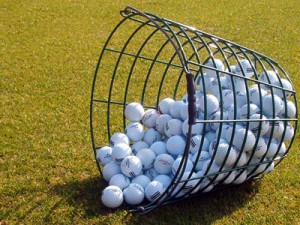Deliberate Practice
 What the Eagles refer to as the circle of fear, modern performance researchers call “deliberate practice.” If you think that term suggests that we’re talking about something beyond normal practice, you’re right. Researcher and senior editor at Fortune magazine, Geoffrey Colvin, differentiates between practice and deliberate practice this way: “Simply hitting a bucket of balls is not deliberate practice, which is why most golfers don’t get better. Hitting an eight-iron 300 times with a goal of leaving the ball within 20 feet of the pin 80 percent of the time, continually observing results and making appropriate adjustments, and doing that for hours every day—that’s deliberate practice.”
What the Eagles refer to as the circle of fear, modern performance researchers call “deliberate practice.” If you think that term suggests that we’re talking about something beyond normal practice, you’re right. Researcher and senior editor at Fortune magazine, Geoffrey Colvin, differentiates between practice and deliberate practice this way: “Simply hitting a bucket of balls is not deliberate practice, which is why most golfers don’t get better. Hitting an eight-iron 300 times with a goal of leaving the ball within 20 feet of the pin 80 percent of the time, continually observing results and making appropriate adjustments, and doing that for hours every day—that’s deliberate practice.”
Given that example, it’s not hard to figure out why the crowd is small at the top of any given mountain. The following study, cited by Colvin in a Fortune article, serves to confirm that the more one practices, the better one gets: A study of 20-year-old violinists divided them into three groups: good, better, and best (as judged by music conservatory teachers). Those judged “best” had averaged 10,000 hours of deliberate practice since taking up the violin. Those judged “better” averaged 7,500 hours. And those judged “good” averaged 5,000 hours.
Because there are no perfect violinists—or salesmen, executives, teachers, or parents for that matter—we again find evidence for our thesis that practice doesn’t make one perfect, but deliberate practice does make one better.
Is the inability to obtain perfection good news or bad news? That depends on your perspective. Let me suggest a realistic but positive perspective: no matter how good you become, you can always get better. That keeps work and life interesting and challenging. If your current condition of performance was as good as it would ever get, the balance of your days would be pretty monotonous.
The Ten Minutes and Ten Years Tactic
The great thing about practice is that even a little bit of practice can result in demonstrable improvement. Since few people, especially in business, practice at all, think about the difference ten minutes of practice a day on your performance would make. A little investment can yield a big payoff.
Here’s a paradox to think about: the connection between practice and remarkable performance is so well established (based on anecdotal as well as research evidence), that it has given rise to “the ten-year rule.” This rule says that it generally takes a decade (give or take) to reach a level of performance considered to be world-class. Researchers John Horn and Hiromi Masunaga put it this way: “The ten-year rule represents a very rough estimate, and most researchers regard it as a minimum, not an average.”
For instance, look at the ten-year rule at work in these top performers: Tiger Woods began golf at age 18 months, Bobby Fischer studied chess for nine years before becoming a grandmaster at age 16, Yo Yo Ma took up the cello at age four, Warren Buffett spent decades studying corporate financial statements to find companies in which to invest, and Wayne Gretzky was playing hockey with 10-year-olds when he was just six.
Look for more tomorrow.
Are practicing on purpose? Share in the comment box below or connect with me on Facebook and Twitter.








I like the distinction you’ve highlighted between practice & deliberate practice.
Excellent point
Cheers, Greg
I like the distinction you’ve highlighted between practice & deliberate practice.
Excellent point
Cheers, Greg
I get the deliberate practice concept. Works well for me on learning the fiddle. The problem as a business owner is not only the time to practice, but figuring out “practice what?”. Hoping that is your part 3.
Great series of posts.
Like the other comments, I get and agree with your practice distinction. I coach hitters in high school baseball. In our terms, I tell them not to just “beat balls” (practice), but have a purpose for every swing they make (deliberate practice). Also, I point out that they must be careful to practice the right things, things that will help them be successful on the field, not just in the batting cage. It’s very easy in baseball…life too, I guess…to slip into practicing the wrong things. Then, your practice does not make you better, but, in fact, makes you worse. One can become good at what they are practicing without becoming better at what they are trying to achieve.